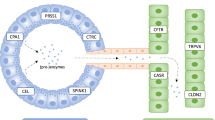Abstract
Objectives
Several genetic risk factors have been identified in adults with idiopathic acute recurrent pancreatitis (IARP). However, the literature regarding the genetics of IARP is sparse in children. In this study, we aimed to analyze the genetic risk factors in children with IARP.
Methods
All children (< 18 years) with ARP from January 2015 to May 2018 were prospectively enrolled in the study. Children with a known cause of ARP like obstructive, toxic/metabolic, and autoimmune were excluded from the final analysis. Children with IARP underwent genetic testing for mutations/polymorphisms in genes known to predispose to pancreatitis including cationic trypsinogen protease serine 1 (PRSS1), serine protease inhibitor Kazal type 1 (SPINK1), cystic fibrosis transmembrane conductance regulator gene (CFTR), chymotrypsin C (CTRC), claudin-2 (CLDN2) and cathepsin B (CTSB).
Results
A total of 239 children (116 boys, 10.3 ± 3.7 years) were enrolled during the study period. Of these, 204 (85.35%) children were identified as IARP. The mean age of symptom onset and the number of pancreatitis episodes were 8.3 ± 3.7 years and 3.3 ± 1.8, respectively. A family history of pancreatitis was noted in 4.6% children. Mutations/polymorphisms in at least 1 gene were identified in 89.5% (129/144) children including SPINK1 in 41.9%, PRSS1 (rs10273639) in 58.2%, CTRC in 25.6%, CTSB in 54.9%, CLDN2 in 72.9%, and CFTR in 2.3%. There was no significant incidence of genetic mutations/polymorphisms in IARP with or without pancreas divisum (95.7 vs 88.4%; p = 0.467).
Conclusions
Genetic alterations are present in the majority of the children with IARP. The incidence of genetic mutations is similar in children with or without pancreas divisum.
Similar content being viewed by others
References
Hasan A, Moscoso DI, Kastrinos F. The role of genetics in pancreatitis. Gastrointest Endosc Clin N Am. 2018;28:587–603.
Sultan M, Werlin S, Venkatasubramani N. Genetic prevalence and characteristics in children with recurrent pancreatitis. J Pediatr Gastroenterol Nutr. 2012;54:645–650.
Vue PM, McFann K, Narkewicz MR. Genetic mutations in pediatric pancreatitis. Pancreas. 2016;45:992–996.
Xiao Y, Yuan W, Yu B, et al. Targeted gene next-generation sequencing in Chinese children with chronic pancreatitis and acute recurrent pancreatitis. J Pediatr. 2017;191:e153.
Morinville VD, Husain SZ, Bai H, et al. Definitions of pediatric pancreatitis and survey of present clinical practices. J Pediatr Gastroenterol Nutr. 2012;55:261–265.
Avanthi SU, Ravi Kanth VV, Agarwal J, et al. Association of claudin2 and PRSS1-PRSS2 polymorphisms with idiopathic recurrent acute and chronic pancreatitis: a case-control study from India. J Gastroenterol Hepatol. 2015;30:1796–1801.
Giefer MJ, Lowe ME, Werlin SL, et al. Early-onset acute recurrent and chronic pancreatitis is associated with PRSS1 or CTRC gene mutations. J Pediatr. 2017;186:95–100.
Saito N, Suzuki M, Sakurai Y, et al. Genetic analysis of Japanese children with acute recurrent and chronic pancreatitis. J Pediatr Gastroenterol Nutr. 2016;63:431–436.
Lucidi V, Alghisi F, Dall’Oglio L, et al. The etiology of acute recurrent pancreatitis in children: a challenge for pediatricians. Pancreas. 2011;40:517–521.
Mahurkar S, Idris MM, Reddy DN, et al. Association of cathepsin B gene polymorphisms with tropical calcific pancreatitis. Gut. 2006;55:1270–1275.
Bertin C, Pelletier AL, Vullierme MP, et al. Pancreas divisum is not a cause of pancreatitis by itself but acts as a partner of genetic mutations. Am J Gastroenterol. 2012;107:311–317.
Lin TK, Abu-El-Haija M, Nathan JD, et al. Pancreas divisum in pediatric acute recurrent and chronic pancreatitis: report from INSPPIRE. J Clin Gastroenterol.. 2019;53:e232–e238.
Funding
There was no funding for the present study.
Author information
Authors and Affiliations
Corresponding author
Ethics declarations
Conflict of interest
The authors declare no conflict of interest.
Ethical approval
All procedures performed in studies involving human participants were in accordance with the ethical standards of the institutional research committee and with the 1964 Declaration of Helsinki and its later amendments or comparable ethical standards.
Informed consent
Informed consent was obtained from all the participants in the study.
Additional information
Publisher's Note
Springer Nature remains neutral with regard to jurisdictional claims in published maps and institutional affiliations.
Electronic supplementary material
Below is the link to the electronic supplementary material.
Rights and permissions
About this article
Cite this article
Nabi, Z., Talukdar, R., Venkata, R. et al. Genetic Evaluation of Children with Idiopathic Recurrent Acute Pancreatitis. Dig Dis Sci 65, 3000–3005 (2020). https://doi.org/10.1007/s10620-019-06026-2
Received:
Accepted:
Published:
Issue Date:
DOI: https://doi.org/10.1007/s10620-019-06026-2



